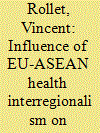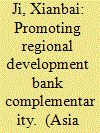|
|
|
Sort Order |
|
|
|
Items / Page
|
|
|
|
|
|
|
| Srl | Item |
| 1 |
ID:
154433


|
|
|
|
|
| Summary/Abstract |
The establishment of the ASEAN Economic Community (AEC) should transform this regional association of states into “single market and production base, a highly competitive economic region, a region of equitable economic development, and a region fully integrated into the global economy” (AEC Blueprint). The present study analyzes the current level of progress in introducing a regional competition law and policy that would create a level playing field for the businesses within the AEC. The paper also addresses the functionality of current “ASEAN way” of coordinating the enforcement of the national competition laws across the ASEAN jurisdictions. The second part of the study outlines the experiences of the decade of decentralized enforcement of competition rules within the Internal Market of the European Union (EU) through cooperation and coordination between the EU Commission and national competition authorities (NCAs) of the EU Member States within the European Competition Network (ECN). Special focus of the research is on the “effect on trade”, which is used as a jurisdictional criterion that determines application of the EU competition rules and national competition rules. The lessons from the functioning of the ECN can be instructive for the development of the regional framework for competition law and policy in the AEC and wider Asia-Pacific region, where the growing number of the national competition law regimes require cooperation and coordination among the NCAs and more generally between the states under the multitude of regional free trade agreements and bilateral investment treaties, which often contain competition enforcement obligations.
|
|
|
|
|
|
|
|
|
|
|
|
|
|
|
|
| 2 |
ID:
154428


|
|
|
|
|
| Summary/Abstract |
Over the past decade, remarkable and sustainable progresses have been made in the Association of Southeast Asian Nations (ASEAN) region in the domain of communicable disease control. Nevertheless, communicable diseases remain an important public health issue in the region. In December 2009, within the framework of its Regional Programming for Asia (2007–2013), the European Union (EU) launched a Regional Program on Highly Pathogenic and Emerging Diseases (HPED) in Asia. This 4-year interregional cooperation initiative aimed at enable ASEAN to control zoonoses and to improve pandemic preparedness in the region. Assessing this interregional initiative, the main objective of this paper is to shed light on the nature and functions of health interregionalism between Asia and Europe and its influence on regional health governance. It concludes that while in the specific context of the EU-ASEAN HPED program, health interregionalism had varied functions and a substantial influence on regional health governance, this initiative did not use the full potential that interregional health mechanism may provide to influence the development of another region or to promote the EU’s specific actorness in regional and global health.
|
|
|
|
|
|
|
|
|
|
|
|
|
|
|
|
| 3 |
ID:
154430


|
|
|
|
|
| Summary/Abstract |
This article explores the Asia–Europe Parliamentary Partnership (ASEP), which is the parliamentary dimension of the Asia–Europe Meeting (ASEM), from the perspective of the National Diet of Japan. ASEP brings together Japan’s key neighbours and trade partners, including the European Union, its so-called natural partner with whom it shares common values. This article argues that the Japanese Diet members perform a three-level norm promotion process at ASEP. First, they promote the norms and agenda of the Japanese government and thus their activity mirrors Japan’s policies on EU, ASEM and global issues. Even the same challenges, for example the untapped partnership with Europe, are visible. Second, they drive their own personal or party agendas, demonstrating that parliamentarians are not merely mouthpieces of the government but bring plurality and even dissonance to Japan’s message. Third, they promote parliamentary empowerment and participation in international affairs, norms that facilitate the Diet Members’ ability to oversee the Asia–Europe agenda as well as empower other participating parliaments. By taking the perspective of one country, this article provides insights to the little known workings of the Asia–Europe Parliamentary Partnership.
|
|
|
|
|
|
|
|
|
|
|
|
|
|
|
|
| 4 |
ID:
154432


|
|
|
|
|
| Summary/Abstract |
Turkey’s negotiations on accession to the EU began on October 3, 2005. After more than 10 years, the future course of negotiations becomes as ambivalent and ambiguous as ever. While the fundamental debate on Turkey’s accession to the EU was about whether Turkey should be a full-member state or a ‘privileged partner’, the axis of Turkey’s integration to the EU began shifting to one of Turkey’s choice between ‘privileged partnership’ and non-accession. The main reason for making such an assumption is that there is no reliable evidence in the last decade to predict whether or not Turkey can, aims to or will ever become a full member of the EU. In addition to this, key actors of the EU such as France and Germany openly declared their opposition to Turkey’s accession and several EU member states including France and Austria announced their plans for a referendum on Turkey’s full membership. Therefore, it would be feasible to explore the possibilities of alternative choices to unification in advance.
|
|
|
|
|
|
|
|
|
|
|
|
|
|
|
|
| 5 |
ID:
154429


|
|
|
|
|
| Summary/Abstract |
As the international development finance architecture decentralises, a plethora of regional multilateral development banks (MDBs) emerge. The institutional landscape in Asia is transforming with the establishment of the Asian Infrastructure Investment Bank (AIIB). This paper aims to shed light on the horizontal relationship between the traditional development actor, the Asian Development Bank (ADB), and the nascent AIIB. Based on the collaborative experiences of the European Investment Bank (EIB) and the European Bank for Reconstruction and Development (EBRD), this article recommends that ADB and the AIIB should form tri-partite coordination mechanism to promote cooperation, develop complementary portfolios in terms of sectoral exposure and geographical coverage and co-fund projects to catalyse greater inter-agency cooperation. The resulting synergies will stitch the two institutions into an interdependent and coherent development finance structure in Asia and beyond.
|
|
|
|
|
|
|
|
|
|
|
|
|
|
|
|
| 6 |
ID:
154431


|
|
|
|
|
| Summary/Abstract |
With increasing controversy over vicious jokes on traumatic events in contemporary Korean history, it appears that the main interest of human rights in Korea is currently shifting from “freedom of expression” to “the right to ask not to express.” As voices asserting the need for regulatory intervention have become prominent, bills for punishing the denial and distortion of history were proposed, including one on punishing the deniers of dictatorial past in 2013 and two on punishing the distortion of colonial past in 2014. This paper traces the legal discourse surrounding the issuance and review of these three bills. I will begin by analyzing how the main features of the bills collide with fundamental principles within criminal law, and how this collision reflects legislative orientation towards protecting social memories under the umbrella of soziale Rechtsgüter. After illuminating the ways in which juridification—based on the normative strategy of repetitively referring to the case of Holocaust deniers in Europe—operates as a regulatory norm within society regardless of the legal status of a particular proposal, I will examine how such “remembrance through regulation” may (mis)operate, resulting in what Gunther Teubner had termed “regulatory trilemma” in East Asian public sphere.
|
|
|
|
|
|
|
|
|
|
|
|
|
|
|
|
|
|
|
|
|